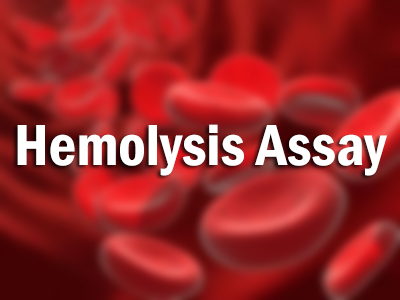Hemolysis Assay Labs
저자: 업로드:2017-09-11 조회수:
The hemolysis assay is used to determine the hemolytic effect of a test compound.

Hemolytic activity is a requirement to be tested for any blood
contacting medical device. The test is based on erythrocyte lysis
induced by contact, leachables, toxins, metal ions, surface charge or
any other cause of erythrocyte lysis. The current description is based
on direct contact of biomaterial and an erythrocyte suspension. The
method is based on release of hemoglobin, which can be measured
spectrophotometrically. This method is suited to evaluate the
hemocompatibility of biomaterials and medical devices according to the
international standard ISO 10993-4:2002.
The Hemolysis test is
designed to determine the hemolytic properties of a medical
device/material. This test is performed on medical devices/materials
that have direct or indirect blood contact.
-
Evaluate your small molecule, biologic, or formulation excipients for its potential to lyse red blood cells
-
Personalized
experimental design to ensure the most relevant data is obtained with
the options to examine all relevant in vivo pharmacologically relevant
blood from appropriate species
-
All assays are performed with high-quality reagents and strict controls by experienced immunologists
Required from Customer
-
Either a minimum of 300 µL of test compound at 10 mM in DMSO, or 5 mg of powder
-
Molecular mass (exact mass) of the test compound and its salt form
-
MSDS and handling and storage information, e.g., light sensitive, store at -20°C, etc.
Deliverables
-
Percent of hemolysis in each sample
-
Rate of hemolysis, if applicable
Substrate
-
Test
compound dissolved in DMSO applied to a suspension of red blood cells
in isotonic buffer or plasma. The final dosing concentration is
typically 10 uM or the clinical Cmax
Assay System
-
A suspension of red blood cells from a species specified by the customer
-
The positive control: red blood cells treated with 0.1% SDS (sodium dodecyl sulfate) to produce 100% hemolysis
-
The negative control: red blood cells treated with DMSO
Assay Conditions
-
Prepare three separate test tubes (N=3) containing red blood cells dosed with the test compound dissolved in DMSO
-
Incubated at 37°C in a water bath with mild agitation
-
Sample each replicate at 0, 5, 15, 30, 60, 120 and 180 minutes
-
Centrifuge each sample
-
Measure the absorbance of the supernatant from each sample using a UV/Vis spectrometer
-
Calculate percent hemolysis at each sampling time point
Assay Dynamic Range
-
Hemolysis can be determined from between 10 and 100% with a typical precision (N=3) of 10%
Assay QC
-
Positive and negative controls run with each compound
Options
The customer may select:
